BWF Shuttle Time Programme: Object Control vs Locomotor Skills
VerifiedAdded on 2023/01/19
|11
|3473
|81
Report
AI Summary
This report investigates the impact of the Badminton World Federation (BWF) Shuttle Time Programme on children's fundamental movement skills (FMS), specifically focusing on locomotor and object control skills. The study explores the benefits of the BWF program as a school-based intervention, aiming to improve movement skills and competencies through badminton. It examines the differences between object control and locomotor skills, considering gender variations and the effectiveness of the program compared to traditional physical education. The research utilizes ANOVA to analyze data from intervention and control groups, assessing the impact of six weeks of the BWF Shuttle Time program on children aged 6-7 and 10-11 years old. The report highlights the importance of developing FMS in childhood for promoting physical activity, preventing overweight, and potentially leading to sports specialization. The findings aim to clarify the program's effectiveness in enhancing children's movement skills and overall health, while also addressing the gap in understanding gender-specific responses to the intervention.
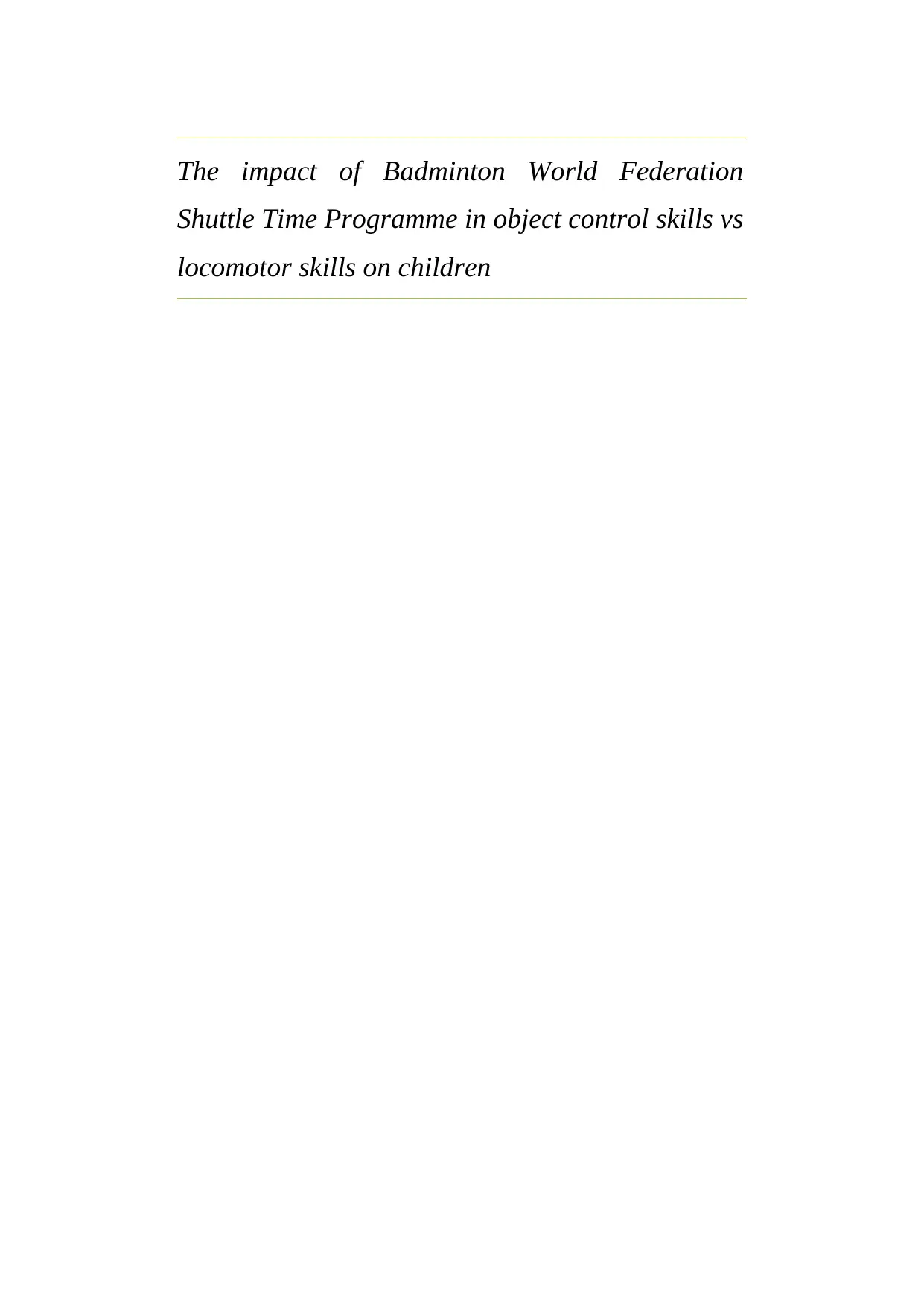
The impact of Badminton World Federation
Shuttle Time Programme in object control skills vs
locomotor skills on children
Shuttle Time Programme in object control skills vs
locomotor skills on children
Paraphrase This Document
Need a fresh take? Get an instant paraphrase of this document with our AI Paraphraser
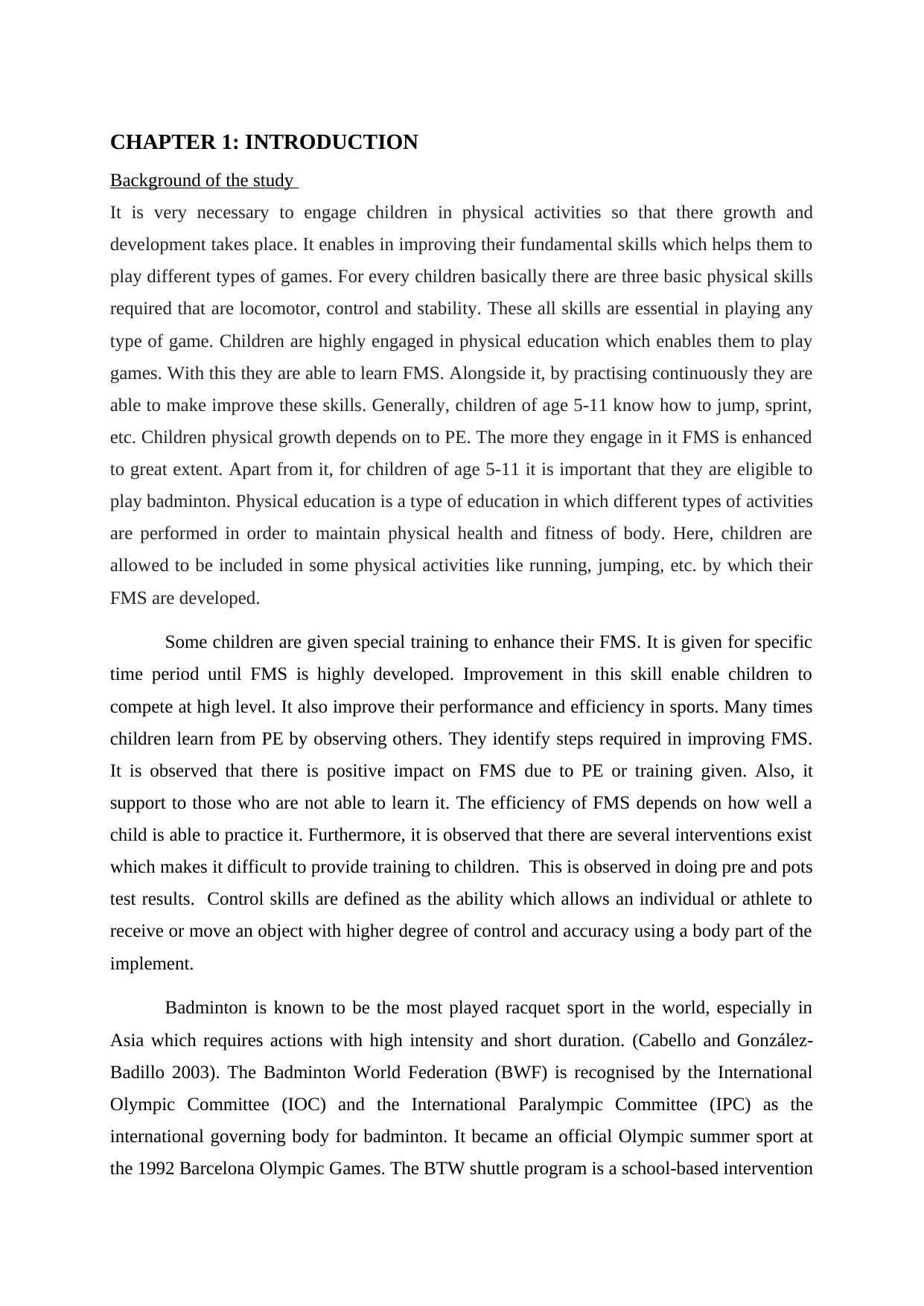
CHAPTER 1: INTRODUCTION
Background of the study
It is very necessary to engage children in physical activities so that there growth and
development takes place. It enables in improving their fundamental skills which helps them to
play different types of games. For every children basically there are three basic physical skills
required that are locomotor, control and stability. These all skills are essential in playing any
type of game. Children are highly engaged in physical education which enables them to play
games. With this they are able to learn FMS. Alongside it, by practising continuously they are
able to make improve these skills. Generally, children of age 5-11 know how to jump, sprint,
etc. Children physical growth depends on to PE. The more they engage in it FMS is enhanced
to great extent. Apart from it, for children of age 5-11 it is important that they are eligible to
play badminton. Physical education is a type of education in which different types of activities
are performed in order to maintain physical health and fitness of body. Here, children are
allowed to be included in some physical activities like running, jumping, etc. by which their
FMS are developed.
Some children are given special training to enhance their FMS. It is given for specific
time period until FMS is highly developed. Improvement in this skill enable children to
compete at high level. It also improve their performance and efficiency in sports. Many times
children learn from PE by observing others. They identify steps required in improving FMS.
It is observed that there is positive impact on FMS due to PE or training given. Also, it
support to those who are not able to learn it. The efficiency of FMS depends on how well a
child is able to practice it. Furthermore, it is observed that there are several interventions exist
which makes it difficult to provide training to children. This is observed in doing pre and pots
test results. Control skills are defined as the ability which allows an individual or athlete to
receive or move an object with higher degree of control and accuracy using a body part of the
implement.
Badminton is known to be the most played racquet sport in the world, especially in
Asia which requires actions with high intensity and short duration. (Cabello and González-
Badillo 2003). The Badminton World Federation (BWF) is recognised by the International
Olympic Committee (IOC) and the International Paralympic Committee (IPC) as the
international governing body for badminton. It became an official Olympic summer sport at
the 1992 Barcelona Olympic Games. The BTW shuttle program is a school-based intervention
Background of the study
It is very necessary to engage children in physical activities so that there growth and
development takes place. It enables in improving their fundamental skills which helps them to
play different types of games. For every children basically there are three basic physical skills
required that are locomotor, control and stability. These all skills are essential in playing any
type of game. Children are highly engaged in physical education which enables them to play
games. With this they are able to learn FMS. Alongside it, by practising continuously they are
able to make improve these skills. Generally, children of age 5-11 know how to jump, sprint,
etc. Children physical growth depends on to PE. The more they engage in it FMS is enhanced
to great extent. Apart from it, for children of age 5-11 it is important that they are eligible to
play badminton. Physical education is a type of education in which different types of activities
are performed in order to maintain physical health and fitness of body. Here, children are
allowed to be included in some physical activities like running, jumping, etc. by which their
FMS are developed.
Some children are given special training to enhance their FMS. It is given for specific
time period until FMS is highly developed. Improvement in this skill enable children to
compete at high level. It also improve their performance and efficiency in sports. Many times
children learn from PE by observing others. They identify steps required in improving FMS.
It is observed that there is positive impact on FMS due to PE or training given. Also, it
support to those who are not able to learn it. The efficiency of FMS depends on how well a
child is able to practice it. Furthermore, it is observed that there are several interventions exist
which makes it difficult to provide training to children. This is observed in doing pre and pots
test results. Control skills are defined as the ability which allows an individual or athlete to
receive or move an object with higher degree of control and accuracy using a body part of the
implement.
Badminton is known to be the most played racquet sport in the world, especially in
Asia which requires actions with high intensity and short duration. (Cabello and González-
Badillo 2003). The Badminton World Federation (BWF) is recognised by the International
Olympic Committee (IOC) and the International Paralympic Committee (IPC) as the
international governing body for badminton. It became an official Olympic summer sport at
the 1992 Barcelona Olympic Games. The BTW shuttle program is a school-based intervention
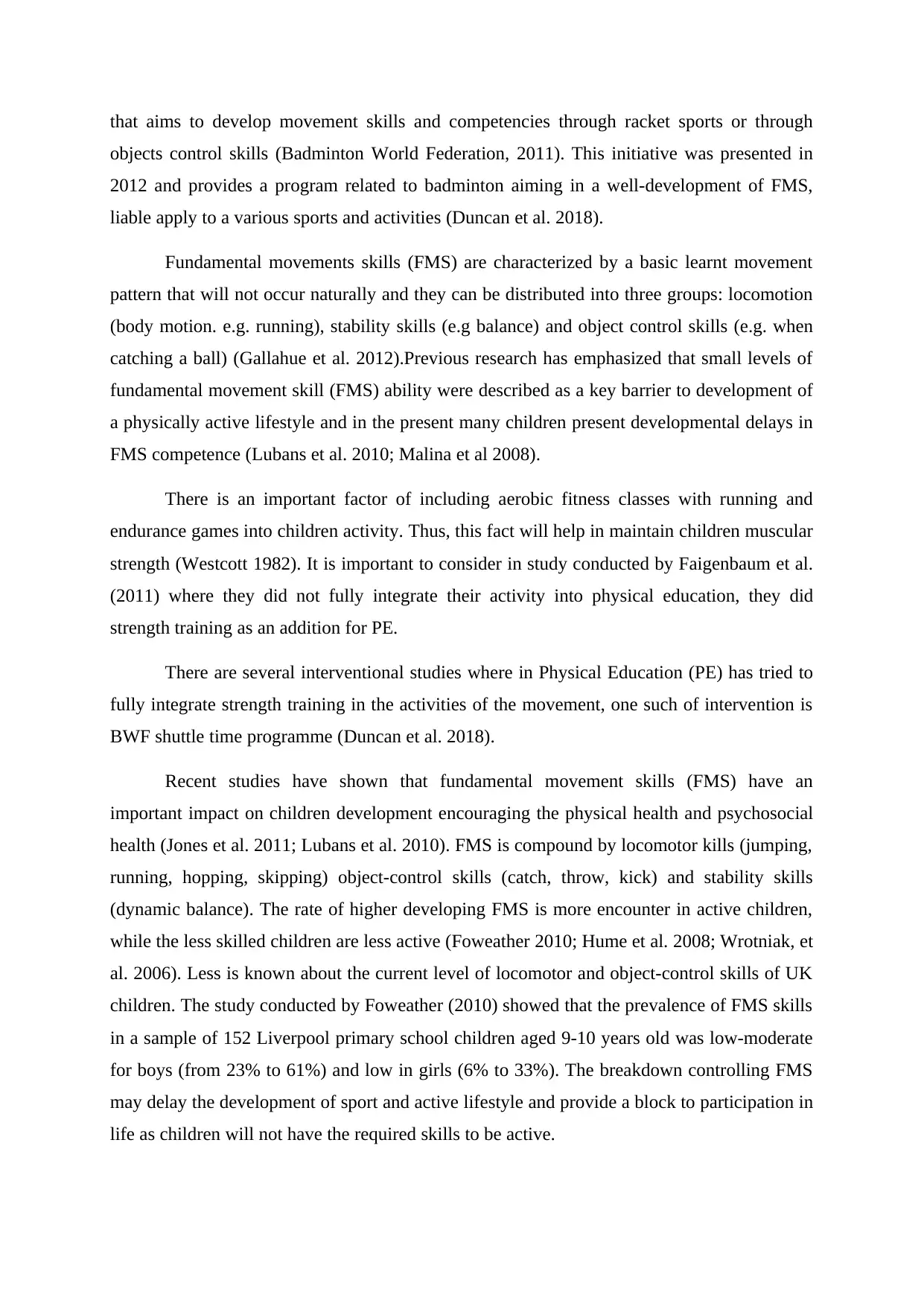
that aims to develop movement skills and competencies through racket sports or through
objects control skills (Badminton World Federation, 2011). This initiative was presented in
2012 and provides a program related to badminton aiming in a well-development of FMS,
liable apply to a various sports and activities (Duncan et al. 2018).
Fundamental movements skills (FMS) are characterized by a basic learnt movement
pattern that will not occur naturally and they can be distributed into three groups: locomotion
(body motion. e.g. running), stability skills (e.g balance) and object control skills (e.g. when
catching a ball) (Gallahue et al. 2012).Previous research has emphasized that small levels of
fundamental movement skill (FMS) ability were described as a key barrier to development of
a physically active lifestyle and in the present many children present developmental delays in
FMS competence (Lubans et al. 2010; Malina et al 2008).
There is an important factor of including aerobic fitness classes with running and
endurance games into children activity. Thus, this fact will help in maintain children muscular
strength (Westcott 1982). It is important to consider in study conducted by Faigenbaum et al.
(2011) where they did not fully integrate their activity into physical education, they did
strength training as an addition for PE.
There are several interventional studies where in Physical Education (PE) has tried to
fully integrate strength training in the activities of the movement, one such of intervention is
BWF shuttle time programme (Duncan et al. 2018).
Recent studies have shown that fundamental movement skills (FMS) have an
important impact on children development encouraging the physical health and psychosocial
health (Jones et al. 2011; Lubans et al. 2010). FMS is compound by locomotor kills (jumping,
running, hopping, skipping) object-control skills (catch, throw, kick) and stability skills
(dynamic balance). The rate of higher developing FMS is more encounter in active children,
while the less skilled children are less active (Foweather 2010; Hume et al. 2008; Wrotniak, et
al. 2006). Less is known about the current level of locomotor and object-control skills of UK
children. The study conducted by Foweather (2010) showed that the prevalence of FMS skills
in a sample of 152 Liverpool primary school children aged 9-10 years old was low-moderate
for boys (from 23% to 61%) and low in girls (6% to 33%). The breakdown controlling FMS
may delay the development of sport and active lifestyle and provide a block to participation in
life as children will not have the required skills to be active.
objects control skills (Badminton World Federation, 2011). This initiative was presented in
2012 and provides a program related to badminton aiming in a well-development of FMS,
liable apply to a various sports and activities (Duncan et al. 2018).
Fundamental movements skills (FMS) are characterized by a basic learnt movement
pattern that will not occur naturally and they can be distributed into three groups: locomotion
(body motion. e.g. running), stability skills (e.g balance) and object control skills (e.g. when
catching a ball) (Gallahue et al. 2012).Previous research has emphasized that small levels of
fundamental movement skill (FMS) ability were described as a key barrier to development of
a physically active lifestyle and in the present many children present developmental delays in
FMS competence (Lubans et al. 2010; Malina et al 2008).
There is an important factor of including aerobic fitness classes with running and
endurance games into children activity. Thus, this fact will help in maintain children muscular
strength (Westcott 1982). It is important to consider in study conducted by Faigenbaum et al.
(2011) where they did not fully integrate their activity into physical education, they did
strength training as an addition for PE.
There are several interventional studies where in Physical Education (PE) has tried to
fully integrate strength training in the activities of the movement, one such of intervention is
BWF shuttle time programme (Duncan et al. 2018).
Recent studies have shown that fundamental movement skills (FMS) have an
important impact on children development encouraging the physical health and psychosocial
health (Jones et al. 2011; Lubans et al. 2010). FMS is compound by locomotor kills (jumping,
running, hopping, skipping) object-control skills (catch, throw, kick) and stability skills
(dynamic balance). The rate of higher developing FMS is more encounter in active children,
while the less skilled children are less active (Foweather 2010; Hume et al. 2008; Wrotniak, et
al. 2006). Less is known about the current level of locomotor and object-control skills of UK
children. The study conducted by Foweather (2010) showed that the prevalence of FMS skills
in a sample of 152 Liverpool primary school children aged 9-10 years old was low-moderate
for boys (from 23% to 61%) and low in girls (6% to 33%). The breakdown controlling FMS
may delay the development of sport and active lifestyle and provide a block to participation in
life as children will not have the required skills to be active.
⊘ This is a preview!⊘
Do you want full access?
Subscribe today to unlock all pages.

Trusted by 1+ million students worldwide
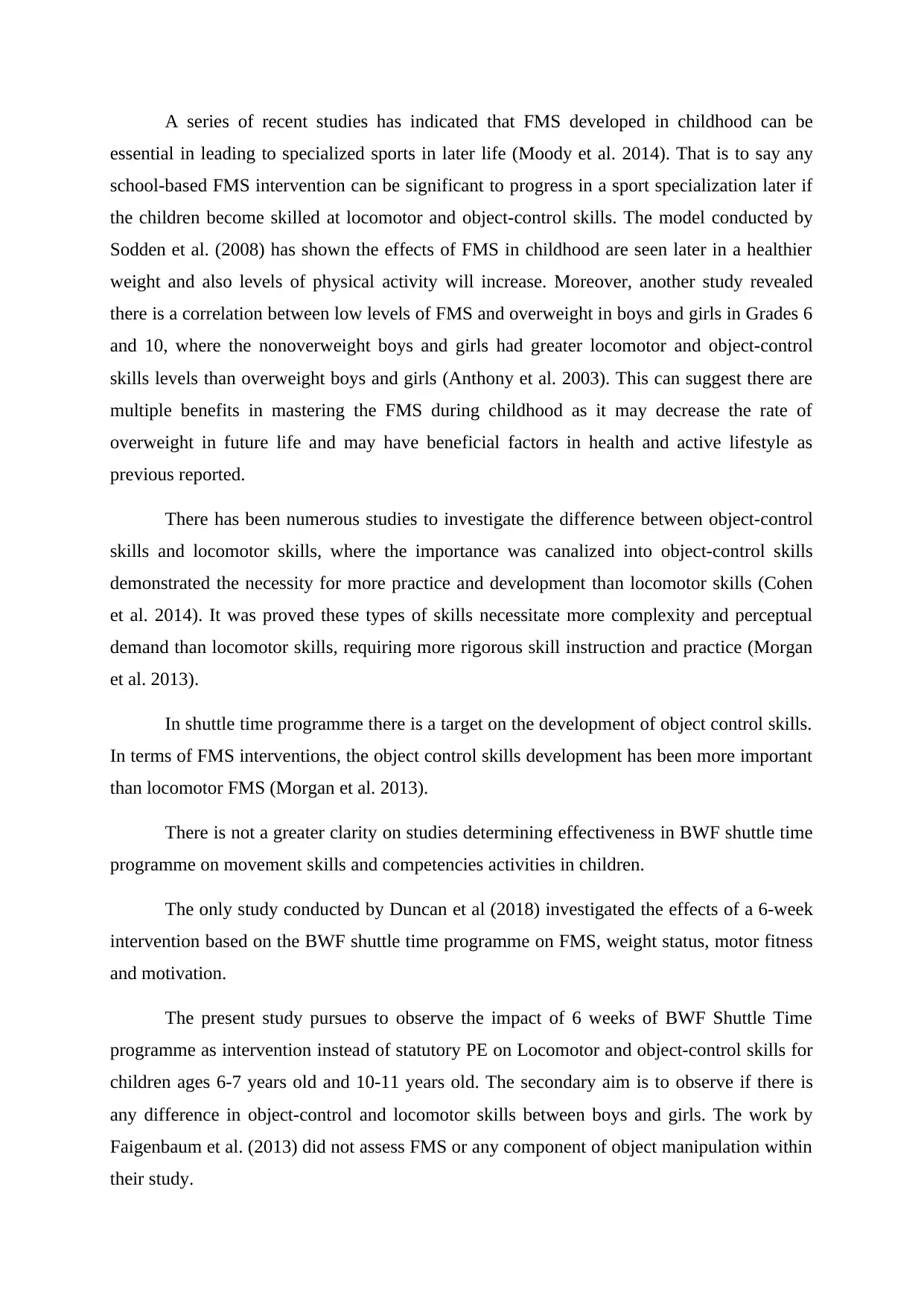
A series of recent studies has indicated that FMS developed in childhood can be
essential in leading to specialized sports in later life (Moody et al. 2014). That is to say any
school-based FMS intervention can be significant to progress in a sport specialization later if
the children become skilled at locomotor and object-control skills. The model conducted by
Sodden et al. (2008) has shown the effects of FMS in childhood are seen later in a healthier
weight and also levels of physical activity will increase. Moreover, another study revealed
there is a correlation between low levels of FMS and overweight in boys and girls in Grades 6
and 10, where the nonoverweight boys and girls had greater locomotor and object-control
skills levels than overweight boys and girls (Anthony et al. 2003). This can suggest there are
multiple benefits in mastering the FMS during childhood as it may decrease the rate of
overweight in future life and may have beneficial factors in health and active lifestyle as
previous reported.
There has been numerous studies to investigate the difference between object-control
skills and locomotor skills, where the importance was canalized into object-control skills
demonstrated the necessity for more practice and development than locomotor skills (Cohen
et al. 2014). It was proved these types of skills necessitate more complexity and perceptual
demand than locomotor skills, requiring more rigorous skill instruction and practice (Morgan
et al. 2013).
In shuttle time programme there is a target on the development of object control skills.
In terms of FMS interventions, the object control skills development has been more important
than locomotor FMS (Morgan et al. 2013).
There is not a greater clarity on studies determining effectiveness in BWF shuttle time
programme on movement skills and competencies activities in children.
The only study conducted by Duncan et al (2018) investigated the effects of a 6-week
intervention based on the BWF shuttle time programme on FMS, weight status, motor fitness
and motivation.
The present study pursues to observe the impact of 6 weeks of BWF Shuttle Time
programme as intervention instead of statutory PE on Locomotor and object-control skills for
children ages 6-7 years old and 10-11 years old. The secondary aim is to observe if there is
any difference in object-control and locomotor skills between boys and girls. The work by
Faigenbaum et al. (2013) did not assess FMS or any component of object manipulation within
their study.
essential in leading to specialized sports in later life (Moody et al. 2014). That is to say any
school-based FMS intervention can be significant to progress in a sport specialization later if
the children become skilled at locomotor and object-control skills. The model conducted by
Sodden et al. (2008) has shown the effects of FMS in childhood are seen later in a healthier
weight and also levels of physical activity will increase. Moreover, another study revealed
there is a correlation between low levels of FMS and overweight in boys and girls in Grades 6
and 10, where the nonoverweight boys and girls had greater locomotor and object-control
skills levels than overweight boys and girls (Anthony et al. 2003). This can suggest there are
multiple benefits in mastering the FMS during childhood as it may decrease the rate of
overweight in future life and may have beneficial factors in health and active lifestyle as
previous reported.
There has been numerous studies to investigate the difference between object-control
skills and locomotor skills, where the importance was canalized into object-control skills
demonstrated the necessity for more practice and development than locomotor skills (Cohen
et al. 2014). It was proved these types of skills necessitate more complexity and perceptual
demand than locomotor skills, requiring more rigorous skill instruction and practice (Morgan
et al. 2013).
In shuttle time programme there is a target on the development of object control skills.
In terms of FMS interventions, the object control skills development has been more important
than locomotor FMS (Morgan et al. 2013).
There is not a greater clarity on studies determining effectiveness in BWF shuttle time
programme on movement skills and competencies activities in children.
The only study conducted by Duncan et al (2018) investigated the effects of a 6-week
intervention based on the BWF shuttle time programme on FMS, weight status, motor fitness
and motivation.
The present study pursues to observe the impact of 6 weeks of BWF Shuttle Time
programme as intervention instead of statutory PE on Locomotor and object-control skills for
children ages 6-7 years old and 10-11 years old. The secondary aim is to observe if there is
any difference in object-control and locomotor skills between boys and girls. The work by
Faigenbaum et al. (2013) did not assess FMS or any component of object manipulation within
their study.
Paraphrase This Document
Need a fresh take? Get an instant paraphrase of this document with our AI Paraphraser
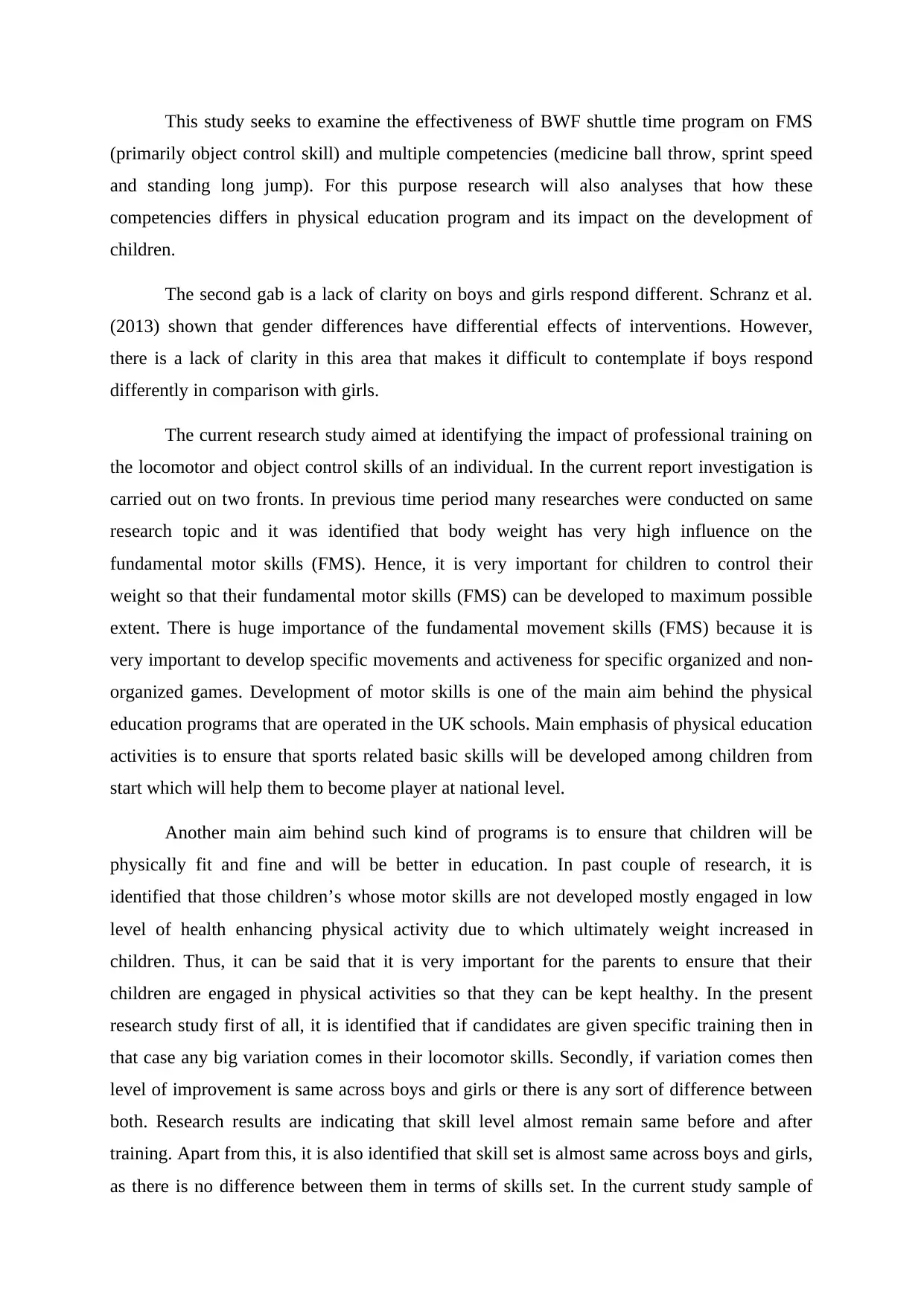
This study seeks to examine the effectiveness of BWF shuttle time program on FMS
(primarily object control skill) and multiple competencies (medicine ball throw, sprint speed
and standing long jump). For this purpose research will also analyses that how these
competencies differs in physical education program and its impact on the development of
children.
The second gab is a lack of clarity on boys and girls respond different. Schranz et al.
(2013) shown that gender differences have differential effects of interventions. However,
there is a lack of clarity in this area that makes it difficult to contemplate if boys respond
differently in comparison with girls.
The current research study aimed at identifying the impact of professional training on
the locomotor and object control skills of an individual. In the current report investigation is
carried out on two fronts. In previous time period many researches were conducted on same
research topic and it was identified that body weight has very high influence on the
fundamental motor skills (FMS). Hence, it is very important for children to control their
weight so that their fundamental motor skills (FMS) can be developed to maximum possible
extent. There is huge importance of the fundamental movement skills (FMS) because it is
very important to develop specific movements and activeness for specific organized and non-
organized games. Development of motor skills is one of the main aim behind the physical
education programs that are operated in the UK schools. Main emphasis of physical education
activities is to ensure that sports related basic skills will be developed among children from
start which will help them to become player at national level.
Another main aim behind such kind of programs is to ensure that children will be
physically fit and fine and will be better in education. In past couple of research, it is
identified that those children’s whose motor skills are not developed mostly engaged in low
level of health enhancing physical activity due to which ultimately weight increased in
children. Thus, it can be said that it is very important for the parents to ensure that their
children are engaged in physical activities so that they can be kept healthy. In the present
research study first of all, it is identified that if candidates are given specific training then in
that case any big variation comes in their locomotor skills. Secondly, if variation comes then
level of improvement is same across boys and girls or there is any sort of difference between
both. Research results are indicating that skill level almost remain same before and after
training. Apart from this, it is also identified that skill set is almost same across boys and girls,
as there is no difference between them in terms of skills set. In the current study sample of
(primarily object control skill) and multiple competencies (medicine ball throw, sprint speed
and standing long jump). For this purpose research will also analyses that how these
competencies differs in physical education program and its impact on the development of
children.
The second gab is a lack of clarity on boys and girls respond different. Schranz et al.
(2013) shown that gender differences have differential effects of interventions. However,
there is a lack of clarity in this area that makes it difficult to contemplate if boys respond
differently in comparison with girls.
The current research study aimed at identifying the impact of professional training on
the locomotor and object control skills of an individual. In the current report investigation is
carried out on two fronts. In previous time period many researches were conducted on same
research topic and it was identified that body weight has very high influence on the
fundamental motor skills (FMS). Hence, it is very important for children to control their
weight so that their fundamental motor skills (FMS) can be developed to maximum possible
extent. There is huge importance of the fundamental movement skills (FMS) because it is
very important to develop specific movements and activeness for specific organized and non-
organized games. Development of motor skills is one of the main aim behind the physical
education programs that are operated in the UK schools. Main emphasis of physical education
activities is to ensure that sports related basic skills will be developed among children from
start which will help them to become player at national level.
Another main aim behind such kind of programs is to ensure that children will be
physically fit and fine and will be better in education. In past couple of research, it is
identified that those children’s whose motor skills are not developed mostly engaged in low
level of health enhancing physical activity due to which ultimately weight increased in
children. Thus, it can be said that it is very important for the parents to ensure that their
children are engaged in physical activities so that they can be kept healthy. In the present
research study first of all, it is identified that if candidates are given specific training then in
that case any big variation comes in their locomotor skills. Secondly, if variation comes then
level of improvement is same across boys and girls or there is any sort of difference between
both. Research results are indicating that skill level almost remain same before and after
training. Apart from this, it is also identified that skill set is almost same across boys and girls,
as there is no difference between them in terms of skills set. In the current study sample of
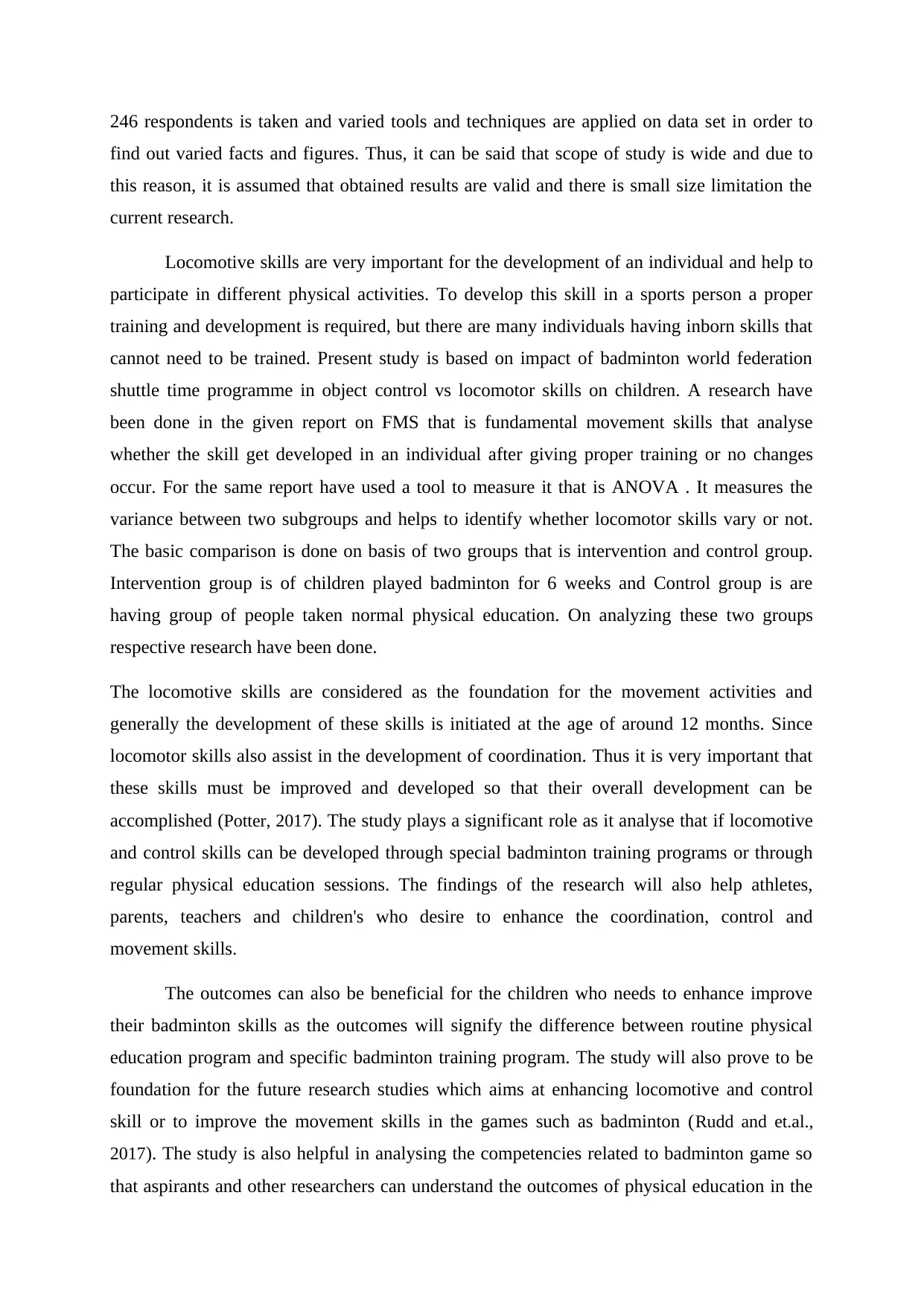
246 respondents is taken and varied tools and techniques are applied on data set in order to
find out varied facts and figures. Thus, it can be said that scope of study is wide and due to
this reason, it is assumed that obtained results are valid and there is small size limitation the
current research.
Locomotive skills are very important for the development of an individual and help to
participate in different physical activities. To develop this skill in a sports person a proper
training and development is required, but there are many individuals having inborn skills that
cannot need to be trained. Present study is based on impact of badminton world federation
shuttle time programme in object control vs locomotor skills on children. A research have
been done in the given report on FMS that is fundamental movement skills that analyse
whether the skill get developed in an individual after giving proper training or no changes
occur. For the same report have used a tool to measure it that is ANOVA . It measures the
variance between two subgroups and helps to identify whether locomotor skills vary or not.
The basic comparison is done on basis of two groups that is intervention and control group.
Intervention group is of children played badminton for 6 weeks and Control group is are
having group of people taken normal physical education. On analyzing these two groups
respective research have been done.
The locomotive skills are considered as the foundation for the movement activities and
generally the development of these skills is initiated at the age of around 12 months. Since
locomotor skills also assist in the development of coordination. Thus it is very important that
these skills must be improved and developed so that their overall development can be
accomplished (Potter, 2017). The study plays a significant role as it analyse that if locomotive
and control skills can be developed through special badminton training programs or through
regular physical education sessions. The findings of the research will also help athletes,
parents, teachers and children's who desire to enhance the coordination, control and
movement skills.
The outcomes can also be beneficial for the children who needs to enhance improve
their badminton skills as the outcomes will signify the difference between routine physical
education program and specific badminton training program. The study will also prove to be
foundation for the future research studies which aims at enhancing locomotive and control
skill or to improve the movement skills in the games such as badminton (Rudd and et.al.,
2017). The study is also helpful in analysing the competencies related to badminton game so
that aspirants and other researchers can understand the outcomes of physical education in the
find out varied facts and figures. Thus, it can be said that scope of study is wide and due to
this reason, it is assumed that obtained results are valid and there is small size limitation the
current research.
Locomotive skills are very important for the development of an individual and help to
participate in different physical activities. To develop this skill in a sports person a proper
training and development is required, but there are many individuals having inborn skills that
cannot need to be trained. Present study is based on impact of badminton world federation
shuttle time programme in object control vs locomotor skills on children. A research have
been done in the given report on FMS that is fundamental movement skills that analyse
whether the skill get developed in an individual after giving proper training or no changes
occur. For the same report have used a tool to measure it that is ANOVA . It measures the
variance between two subgroups and helps to identify whether locomotor skills vary or not.
The basic comparison is done on basis of two groups that is intervention and control group.
Intervention group is of children played badminton for 6 weeks and Control group is are
having group of people taken normal physical education. On analyzing these two groups
respective research have been done.
The locomotive skills are considered as the foundation for the movement activities and
generally the development of these skills is initiated at the age of around 12 months. Since
locomotor skills also assist in the development of coordination. Thus it is very important that
these skills must be improved and developed so that their overall development can be
accomplished (Potter, 2017). The study plays a significant role as it analyse that if locomotive
and control skills can be developed through special badminton training programs or through
regular physical education sessions. The findings of the research will also help athletes,
parents, teachers and children's who desire to enhance the coordination, control and
movement skills.
The outcomes can also be beneficial for the children who needs to enhance improve
their badminton skills as the outcomes will signify the difference between routine physical
education program and specific badminton training program. The study will also prove to be
foundation for the future research studies which aims at enhancing locomotive and control
skill or to improve the movement skills in the games such as badminton (Rudd and et.al.,
2017). The study is also helpful in analysing the competencies related to badminton game so
that aspirants and other researchers can understand the outcomes of physical education in the
⊘ This is a preview!⊘
Do you want full access?
Subscribe today to unlock all pages.

Trusted by 1+ million students worldwide
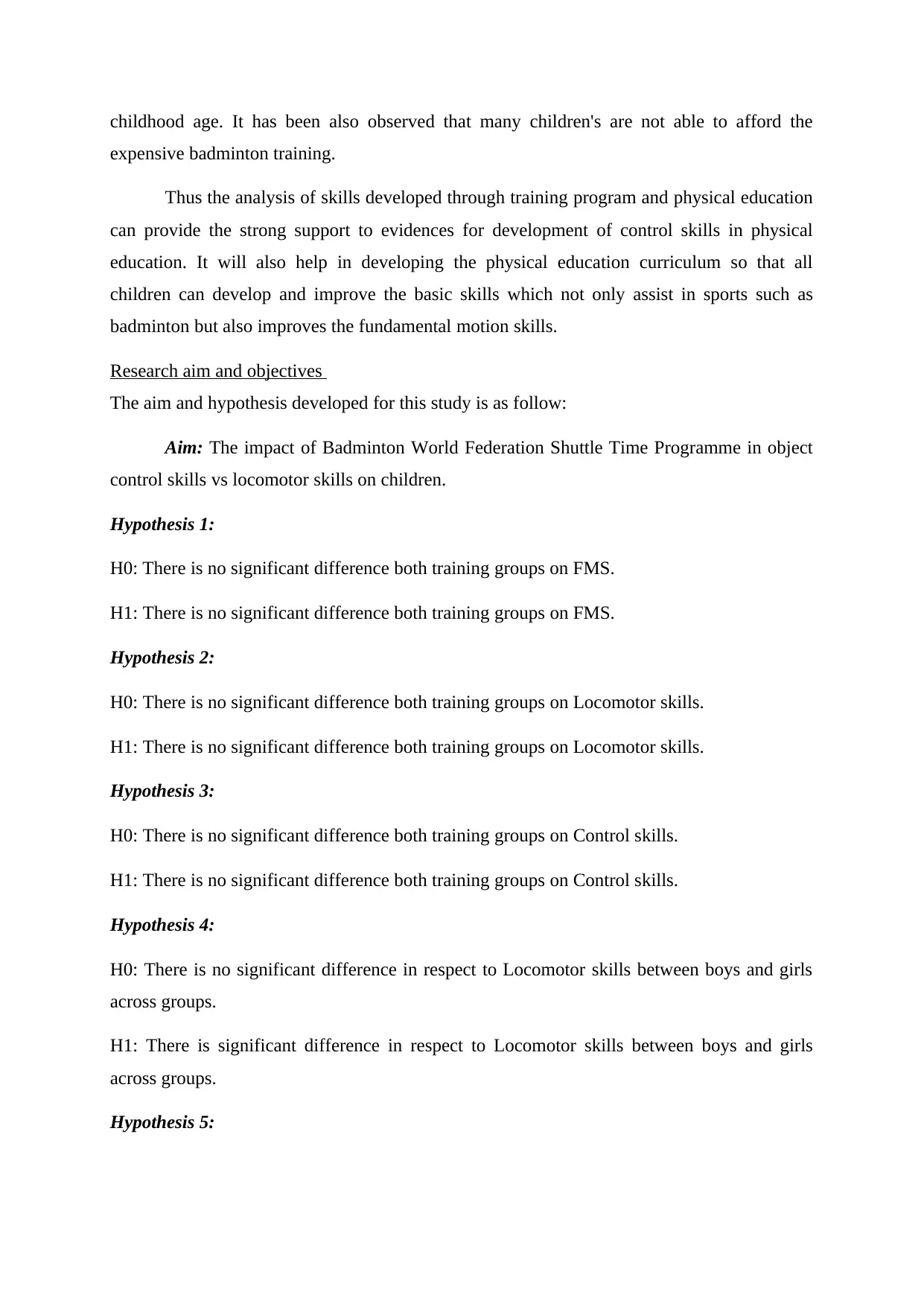
childhood age. It has been also observed that many children's are not able to afford the
expensive badminton training.
Thus the analysis of skills developed through training program and physical education
can provide the strong support to evidences for development of control skills in physical
education. It will also help in developing the physical education curriculum so that all
children can develop and improve the basic skills which not only assist in sports such as
badminton but also improves the fundamental motion skills.
Research aim and objectives
The aim and hypothesis developed for this study is as follow:
Aim: The impact of Badminton World Federation Shuttle Time Programme in object
control skills vs locomotor skills on children.
Hypothesis 1:
H0: There is no significant difference both training groups on FMS.
H1: There is no significant difference both training groups on FMS.
Hypothesis 2:
H0: There is no significant difference both training groups on Locomotor skills.
H1: There is no significant difference both training groups on Locomotor skills.
Hypothesis 3:
H0: There is no significant difference both training groups on Control skills.
H1: There is no significant difference both training groups on Control skills.
Hypothesis 4:
H0: There is no significant difference in respect to Locomotor skills between boys and girls
across groups.
H1: There is significant difference in respect to Locomotor skills between boys and girls
across groups.
Hypothesis 5:
expensive badminton training.
Thus the analysis of skills developed through training program and physical education
can provide the strong support to evidences for development of control skills in physical
education. It will also help in developing the physical education curriculum so that all
children can develop and improve the basic skills which not only assist in sports such as
badminton but also improves the fundamental motion skills.
Research aim and objectives
The aim and hypothesis developed for this study is as follow:
Aim: The impact of Badminton World Federation Shuttle Time Programme in object
control skills vs locomotor skills on children.
Hypothesis 1:
H0: There is no significant difference both training groups on FMS.
H1: There is no significant difference both training groups on FMS.
Hypothesis 2:
H0: There is no significant difference both training groups on Locomotor skills.
H1: There is no significant difference both training groups on Locomotor skills.
Hypothesis 3:
H0: There is no significant difference both training groups on Control skills.
H1: There is no significant difference both training groups on Control skills.
Hypothesis 4:
H0: There is no significant difference in respect to Locomotor skills between boys and girls
across groups.
H1: There is significant difference in respect to Locomotor skills between boys and girls
across groups.
Hypothesis 5:
Paraphrase This Document
Need a fresh take? Get an instant paraphrase of this document with our AI Paraphraser
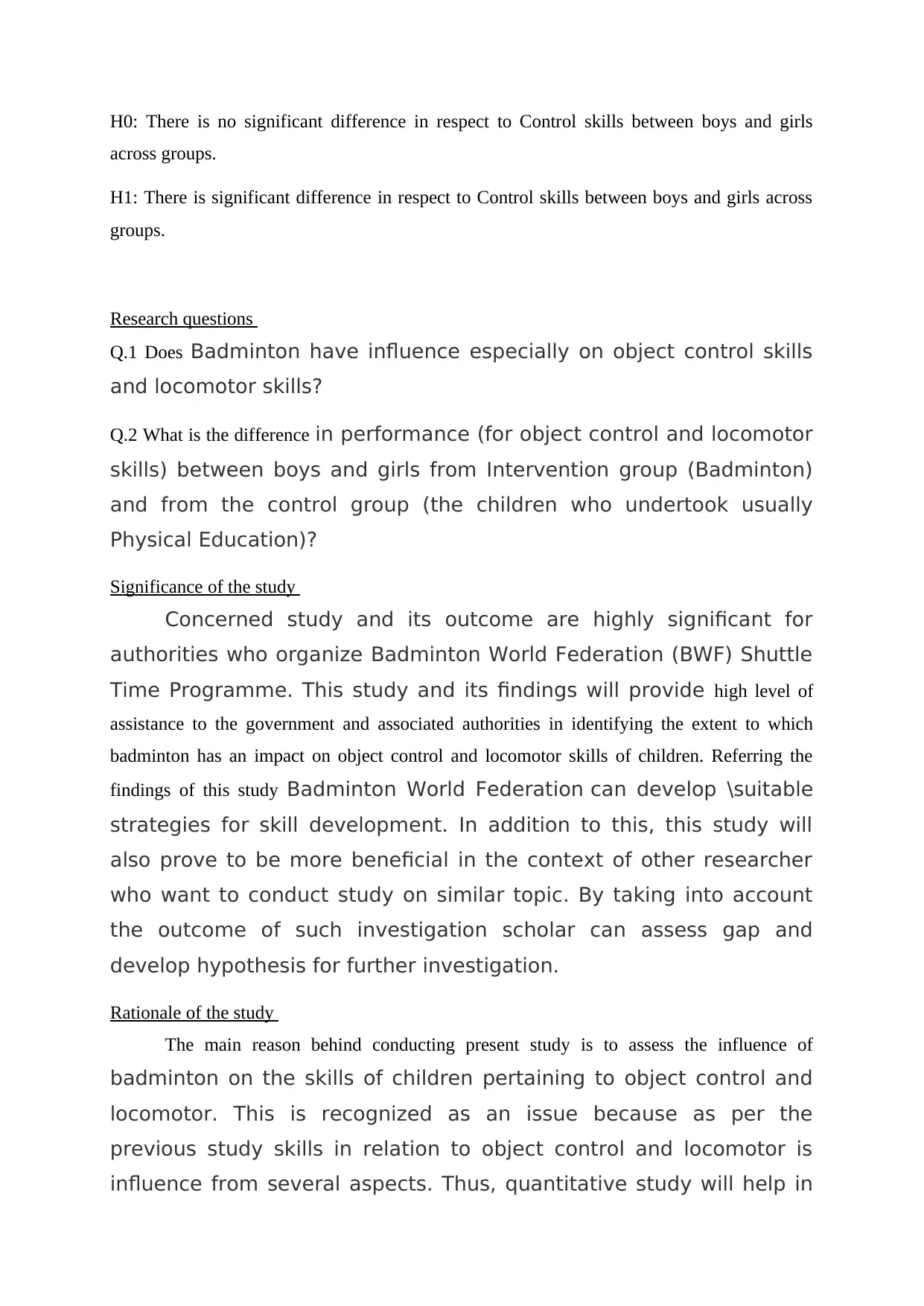
H0: There is no significant difference in respect to Control skills between boys and girls
across groups.
H1: There is significant difference in respect to Control skills between boys and girls across
groups.
Research questions
Q.1 Does Badminton have influence especially on object control skills
and locomotor skills?
Q.2 What is the difference in performance (for object control and locomotor
skills) between boys and girls from Intervention group (Badminton)
and from the control group (the children who undertook usually
Physical Education)?
Significance of the study
Concerned study and its outcome are highly significant for
authorities who organize Badminton World Federation (BWF) Shuttle
Time Programme. This study and its findings will provide high level of
assistance to the government and associated authorities in identifying the extent to which
badminton has an impact on object control and locomotor skills of children. Referring the
findings of this study Badminton World Federation can develop \suitable
strategies for skill development. In addition to this, this study will
also prove to be more beneficial in the context of other researcher
who want to conduct study on similar topic. By taking into account
the outcome of such investigation scholar can assess gap and
develop hypothesis for further investigation.
Rationale of the study
The main reason behind conducting present study is to assess the influence of
badminton on the skills of children pertaining to object control and
locomotor. This is recognized as an issue because as per the
previous study skills in relation to object control and locomotor is
influence from several aspects. Thus, quantitative study will help in
across groups.
H1: There is significant difference in respect to Control skills between boys and girls across
groups.
Research questions
Q.1 Does Badminton have influence especially on object control skills
and locomotor skills?
Q.2 What is the difference in performance (for object control and locomotor
skills) between boys and girls from Intervention group (Badminton)
and from the control group (the children who undertook usually
Physical Education)?
Significance of the study
Concerned study and its outcome are highly significant for
authorities who organize Badminton World Federation (BWF) Shuttle
Time Programme. This study and its findings will provide high level of
assistance to the government and associated authorities in identifying the extent to which
badminton has an impact on object control and locomotor skills of children. Referring the
findings of this study Badminton World Federation can develop \suitable
strategies for skill development. In addition to this, this study will
also prove to be more beneficial in the context of other researcher
who want to conduct study on similar topic. By taking into account
the outcome of such investigation scholar can assess gap and
develop hypothesis for further investigation.
Rationale of the study
The main reason behind conducting present study is to assess the influence of
badminton on the skills of children pertaining to object control and
locomotor. This is recognized as an issue because as per the
previous study skills in relation to object control and locomotor is
influence from several aspects. Thus, quantitative study will help in

reflecting the extent to which object control and locomotor skills of
intervention (Children played Badminton for 6 weeks) and control
group (children who undertook normal Physical Education) differ
from each other.
intervention (Children played Badminton for 6 weeks) and control
group (children who undertook normal Physical Education) differ
from each other.
⊘ This is a preview!⊘
Do you want full access?
Subscribe today to unlock all pages.

Trusted by 1+ million students worldwide
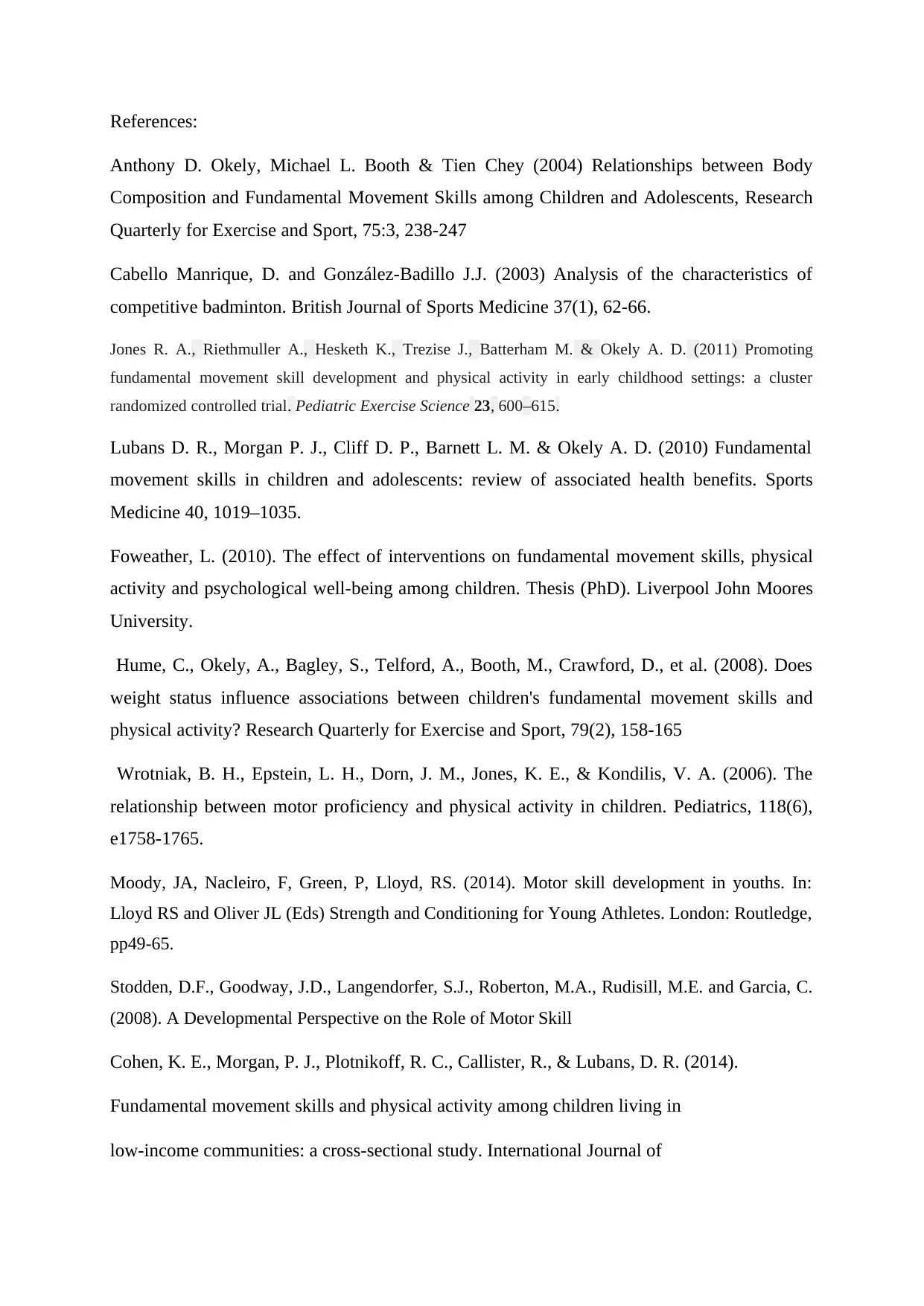
References:
Anthony D. Okely, Michael L. Booth & Tien Chey (2004) Relationships between Body
Composition and Fundamental Movement Skills among Children and Adolescents, Research
Quarterly for Exercise and Sport, 75:3, 238-247
Cabello Manrique, D. and González-Badillo J.J. (2003) Analysis of the characteristics of
competitive badminton. British Journal of Sports Medicine 37(1), 62-66.
Jones R. A., Riethmuller A., Hesketh K., Trezise J., Batterham M. & Okely A. D. (2011) Promoting
fundamental movement skill development and physical activity in early childhood settings: a cluster
randomized controlled trial. Pediatric Exercise Science 23, 600–615.
Lubans D. R., Morgan P. J., Cliff D. P., Barnett L. M. & Okely A. D. (2010) Fundamental
movement skills in children and adolescents: review of associated health benefits. Sports
Medicine 40, 1019–1035.
Foweather, L. (2010). The effect of interventions on fundamental movement skills, physical
activity and psychological well-being among children. Thesis (PhD). Liverpool John Moores
University.
Hume, C., Okely, A., Bagley, S., Telford, A., Booth, M., Crawford, D., et al. (2008). Does
weight status influence associations between children's fundamental movement skills and
physical activity? Research Quarterly for Exercise and Sport, 79(2), 158-165
Wrotniak, B. H., Epstein, L. H., Dorn, J. M., Jones, K. E., & Kondilis, V. A. (2006). The
relationship between motor proficiency and physical activity in children. Pediatrics, 118(6),
e1758-1765.
Moody, JA, Nacleiro, F, Green, P, Lloyd, RS. (2014). Motor skill development in youths. In:
Lloyd RS and Oliver JL (Eds) Strength and Conditioning for Young Athletes. London: Routledge,
pp49-65.
Stodden, D.F., Goodway, J.D., Langendorfer, S.J., Roberton, M.A., Rudisill, M.E. and Garcia, C.
(2008). A Developmental Perspective on the Role of Motor Skill
Cohen, K. E., Morgan, P. J., Plotnikoff, R. C., Callister, R., & Lubans, D. R. (2014).
Fundamental movement skills and physical activity among children living in
low-income communities: a cross-sectional study. International Journal of
Anthony D. Okely, Michael L. Booth & Tien Chey (2004) Relationships between Body
Composition and Fundamental Movement Skills among Children and Adolescents, Research
Quarterly for Exercise and Sport, 75:3, 238-247
Cabello Manrique, D. and González-Badillo J.J. (2003) Analysis of the characteristics of
competitive badminton. British Journal of Sports Medicine 37(1), 62-66.
Jones R. A., Riethmuller A., Hesketh K., Trezise J., Batterham M. & Okely A. D. (2011) Promoting
fundamental movement skill development and physical activity in early childhood settings: a cluster
randomized controlled trial. Pediatric Exercise Science 23, 600–615.
Lubans D. R., Morgan P. J., Cliff D. P., Barnett L. M. & Okely A. D. (2010) Fundamental
movement skills in children and adolescents: review of associated health benefits. Sports
Medicine 40, 1019–1035.
Foweather, L. (2010). The effect of interventions on fundamental movement skills, physical
activity and psychological well-being among children. Thesis (PhD). Liverpool John Moores
University.
Hume, C., Okely, A., Bagley, S., Telford, A., Booth, M., Crawford, D., et al. (2008). Does
weight status influence associations between children's fundamental movement skills and
physical activity? Research Quarterly for Exercise and Sport, 79(2), 158-165
Wrotniak, B. H., Epstein, L. H., Dorn, J. M., Jones, K. E., & Kondilis, V. A. (2006). The
relationship between motor proficiency and physical activity in children. Pediatrics, 118(6),
e1758-1765.
Moody, JA, Nacleiro, F, Green, P, Lloyd, RS. (2014). Motor skill development in youths. In:
Lloyd RS and Oliver JL (Eds) Strength and Conditioning for Young Athletes. London: Routledge,
pp49-65.
Stodden, D.F., Goodway, J.D., Langendorfer, S.J., Roberton, M.A., Rudisill, M.E. and Garcia, C.
(2008). A Developmental Perspective on the Role of Motor Skill
Cohen, K. E., Morgan, P. J., Plotnikoff, R. C., Callister, R., & Lubans, D. R. (2014).
Fundamental movement skills and physical activity among children living in
low-income communities: a cross-sectional study. International Journal of
Paraphrase This Document
Need a fresh take? Get an instant paraphrase of this document with our AI Paraphraser

Behavioral Nutrition and Physical Activity, 11(1), 49. doi: 10.1186/1479-5868
11-49
11-49
1 out of 11
Your All-in-One AI-Powered Toolkit for Academic Success.
+13062052269
info@desklib.com
Available 24*7 on WhatsApp / Email
![[object Object]](/_next/static/media/star-bottom.7253800d.svg)
Unlock your academic potential
© 2024 | Zucol Services PVT LTD | All rights reserved.

